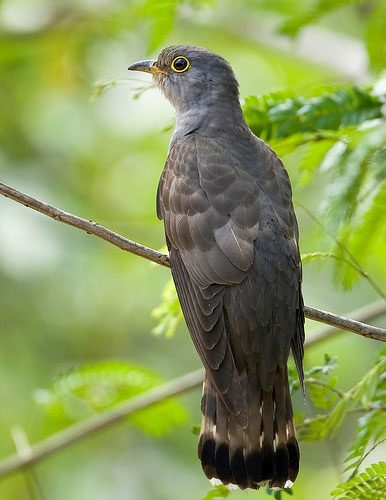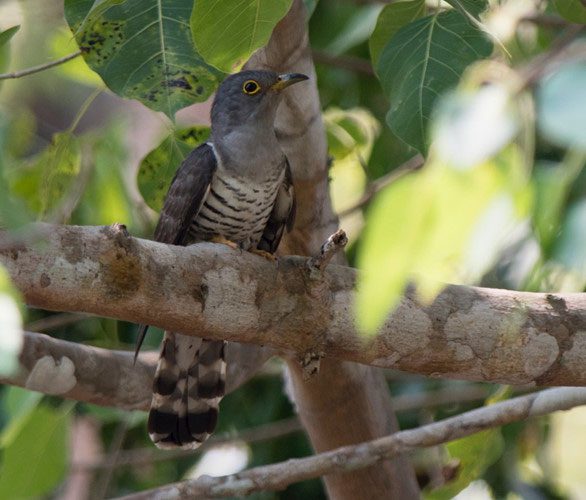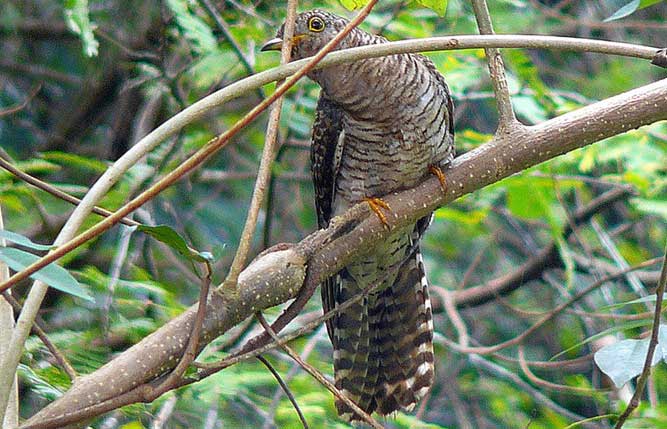Not only does it have a unique name, the bird known as the “Cuculus micropterus,” or the cuckoo, possesses many strange characteristics found in Vietnam. In Vietnam, the Cuculus micropterus can be found in most areas, from mountainous regions to the plains.

The scientific name of the cuckoo is Cuculus micropterus.

This is a medium-sized cuckoo species, with males and females looking quite similar.

Globally, the Cuculus micropterus is distributed across Asia, from Pakistan, India, Sri Lanka to Indonesia in the south and China.

The Cuculus micropterus typically inhabits forests at altitudes above 3,600m.

They have a white upper body while the lower half features various black and white stripes.

Nestlings have orange-red mouths with yellow edges.

This peculiar bird prefers to live in evergreen and temporary green forests, but they also inhabit gardens and bushes.
Due to its calls, many Vietnamese people interpret it as various phrases, such as “five buffaloes, six poles,” “difficult to overcome,” “Indian cuckoo,” “Bac Quang, Bac Muc,” “Hà Giang poison water,” “four girls, ninety,” “nine girls, forty,” “five buffaloes, six stakes,” “tie the girl to the pole,” “the king ties the pole,” “chasing the West to fight the Japanese,” etc.
There are two widely recognized subspecies. The subspecies Cuculus micropterus sp. micropterus is distributed across the Asian continent, while the subspecies Cuculus micropterus sp. concretus S. Müller, 1845 is smaller, darker, and found in the Malay Peninsula, Java, Sumatra, and Borneo. Birds in the Amur region are larger, and Swinhoe referred to this group (from Northern China and above) as Cuculus michieanus, while Walter Norman Koelz described the fatidicus form in northeastern India.
|
The Legend of the Cuculus micropterus Once upon a time, there was a poor farmer who had to work the fields of a wealthy landowner in the village. The landowner was the richest person in the district: he owned countless lands and cattle. Seeing that the farmer was honest and hardworking, always delivering rice on time, the landowner entrusted him with raising cattle. The farmer diligently worked on the fields while raising the cattle, and soon his herd grew to five cows. One day, the landowner suddenly… passed away, and all his estate, including land and cattle, became the sole property of his only daughter. However, many of the things the landowner had entrusted to the tenants were properly documented, while some had not been formalized before his untimely death. The daughter was very much like her father; like father, like daughter, and she was cunning, never willing to lose even a small item to outsiders. After mourning her father, she began to check all the assets left behind. When she arrived at the poor farmer’s house, he was still out tending to the cattle. She only knew he raised cattle but was unaware of the exact number, as the landowner had not recorded it, and asking the household staff yielded vague memories of around five or six cows. Back then, cattle were not kept in stalls; a row of poles was set up at the corner of the yard, and each evening the cows were tied to a pole. When she arrived, she counted six poles and murmured, “Six poles mean six cows.” When the farmer returned with the cattle, she counted again and found only five. “How strange! Did he sell one of my father’s cows without documents because of the news of his death?” Thinking this, she exclaimed loudly, “Hey you! Where is the other cow?” The farmer was surprised: “What do you mean by ‘the other one’? I only have five cows from your father.” She cunningly replied: “Don’t try to trick me; five cows should equal six poles! Don’t tell me you lost one in the woods!” The farmer explained that one pole was nearly broken, so he had to set up another, and in his haste, he had forgotten to remove the old one. She refused to listen, insisting: “No more talking, if you don’t find the cow, it will be difficult for you to live with me. Five cows should equal six poles!” Hearing her keep repeating the phrase “five cows, six poles,” the farmer became angry and snapped: “Only if you tie a girl to a pole could that possibly make six!” She was not one to back down easily, jumping up and hurling insults at him in many ways. The farmer thought that he had always been honest with the landowner, but this daughter treated him like a schemer. Feeling frustrated, he walked away into the forest; she followed closely behind. Whenever she said “five cows, six poles,” he would retort with “tie the girl to the pole.” They both ventured deep into the woods, and after endlessly arguing, they eventually starved to death. Both transformed into birds, living together in the same forest. They foraged from dusk until dawn, one on one mountain and the other on another. The exchange of words had not ceased, with one calling “five cows, six poles,” while the other responded “tie the girl to the pole.” |


















































